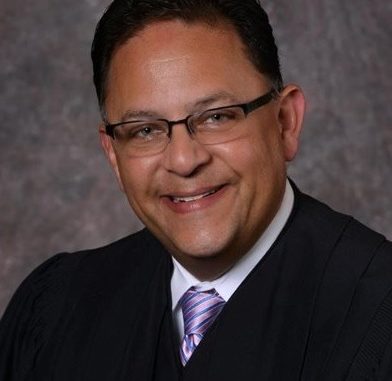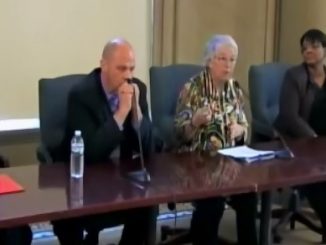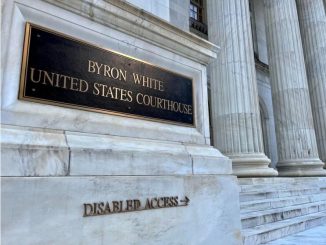
From Betsy Combier, Editor:
by making an order to stop the COVID Vaccine Mandate until unionized city workers in the City of St. Paul voted on it, Judge Leonardo Castro wins our Hero Judge Award.
The order, available in the Pioneer Express article posted below, is good news if you work in the City of Saint Paul Minnesota and you could not get vaccinated because of a medical condition or religious belief. The “vaccination or termination” mandate was stopped by Judge Leonardo Castro (pictured above) until unionized city workers approved it after bargaining in good faith on the terms, and after a negotiated agreement was reached:
“This Court declares, as a matter of law, that unilateral implementation of the COVID-19 Vaccination Policy without negotiating is an unfair labor practice under Minn. Stat. § 179A.13, subd. 2(5). The City’s COVID Vaccination Policy is not an inherent managerial right, and the parties must meet and negotiate as to its implementation.
The City is permanently enjoined from implementing and enforcing the COVID Vaccination Policy until such time as the parties have reached a negotiated agreement on the implementation and enforcement of the Policy, or if no agreement can be reached, until the parties have complied with the interest arbitration requirements of PELR”
Judge Leonardo Castro
This is what NYC unions fought for, but the City unions did not take it to members to be ratified. In New York City, after the Department of Health ruled that all employees of the NYC Department of Education had to be vaccinated against COVID (2 shots) or be terminated, the unions took the NYC DOE to task for not allowing any exemptions/accommodations for those people who could not get the vaccine due to serious medical issues with being vaccinated, or sincere religious beliefs against getting the vaccine. Union members received the arbitration agreement between the unions, called the Scheinman arbitration Award, but none of the unionized city workers were allowed to vote on this Award.
The unions and the DOE could not reach a common set of rules for the exemptions/accommodations, so they brought in the Public Employment Relations Bureau (PERB) to negotiate the terms after an impasse stopped the negotiations. Arbitrator Martin Scheinman of SAMS was brought in to break the impasse and move the settlement forward. Union members received the arbitration agreement between the unions, called the Scheinman Award, but none of the unionized city workers were allowed to vote on this Award. The Award gave an open door to both medical or religious exemptions, and detailed the process wherein an individual could apply for either of these.
I have several problems with Mr. Scheinman’s Award:
- The process for granting or denying medical or religious exemptions are only good until the end of the school year 2021-2022.
- The limitations on the religious exemption request are unconstitutional
- the qualifications for a successful medical exemption are unconstitutional
- The process to hear appeals was unlawful, heard by arbitrators who worked with or for Martin Scheinman and therefore possible not neutral in their decisions.
In other words, the decision-making procedure to grant or deny exemptions to the vaccine mandate were clearly unconstitutional in that petitioners were not allowed a full and fair hearing of their reasons for requesting an exemption.
The City-wide Panel, a mysterious group of individuals, was given the lawful right to make the final decision for many appeals. Mr. Eric Eichenholtz, a member of this Panel, was deposed, and gave what I believe to be shocking information on how the exemptions were granted and denied:
This sounds to me like deliberate indifference to the U.S. Constitution.
just sayin’
Betsy Combier
Editor, Parentadvocates.org
Editor, New York Court Corruption
Editor, National Public Voice
Editor, NYC Public Voice
Editor, Inside 3020-a Teacher Trials
Judge rules in favor of St. Paul unions over COVID vaccination mandate
A judge ruled Thursday that the city of St. Paul’s COVID vaccination policy for police, firefighters and legions of other unionized city workers should have been part of the bargaining process, and he barred the city from enforcing it until it is approved as part of a negotiated agreement.
The employee unions filed lawsuits last year over the coronavirus vaccine mandate for employees, calling it an unfair labor practice — and the judge agreed.
The firefighters’ lawsuit noted that the city didn’t negotiate with the International Association of Fire Fighters Local 21 before making “a unilateral change to the terms and conditions” of employment for Local 21 members.
In his ruling, Ramsey County Judge Leonardo Castro noted that the city didn’t engage in bad faith by implementing the vaccination policy, but nevertheless enacted an unfair labor policy.
“The City was faced with the height of a pandemic and based its actions upon what it believed to be in the best interest of the health and safety of its employees and the public,” Castro wrote in the ruling. “There was no malice, conspiracy or employee targeting involved.”
The city did engage in discussions of the policy with union representatives, Castro wrote, though not in formal bargaining.
For an issue such as injecting your own body with a foreign substance versus losing your job, he reasoned, that’s not enough.
“It is difficult for this Court to imagine what could be more intrusive and more destructive to the employer-employee relationship than requiring employees to forfeit their bodily autonomy in the name of maintaining their livelihood,” he wrote.
Unlike policies for workers at St. Paul Public Schools, Ramsey County, the city of Minneapolis and the state of Minnesota, St. Paul’s policy doesn’t include an option for employees to opt out of vaccination by agreeing to regular COVID-19 testing.
Mayor Melvin Carter announced on Oct. 21 the vaccine mandate for the nearly 4,000 employees of the city. The vaccination policy says workers “will not be permitted to work and may be subject to discipline” if they weren’t vaccinated by Dec. 31. The policy did allow for a religious exemption or an accommodation due to a medical condition or recent treatment for COVID-19.
At the end of last year, a “significant percentage” of firefighters “expressed … personal, moral, religious and/or medical objections to receiving a vaccination,” according to an affidavit from Mike Smith, Local 21 president. He and the police union estimated in November that 20 percent of their members weren’t vaccinated. The fire department’s authorized strength is 435.
Chris Wachtler, the attorney representing several unions who sued, said he was pleased with the ruling but emphasized it didn’t reflect an anti-vaccine sentiment by the unions he represents, which include firefighters and supervisors, as well as a host of workers in city departments that range from public works to transportation.
“The unions are not against vaccinations per se,” Wachtler said. “That wasn’t what this was about. This was about a narrow labor issue. … They (city leaders) weren’t going to give a testing option from the very beginning. That’s all we ever asked for.”
The unions and the city held limited talks before the city put the mandate in place. Castro’s ruling appears to essentially send the city and the unions back to the bargaining table, where Wachtler said he expects his unions to ask for an exception to the vaccine mandate that would allow workers to regularly get tested for COVID-19 instead.
“I am very confident that had the city done that from the beginning, we wouldn’t have had this legal option battle,” he said.
City of St. Paul spokesman Kamal Baker said officials are “reviewing the court’s decision and (are) considering the best path forward to reduce the spread and severity of COVID-19 to ensure the safety of our employees and residents. We remain committed to our efforts to have a fully vaccinated workforce.”
The effectiveness of testing as a means to reduce workplace transmission right now is unclear, since coronavirus variants currently circulating are frequently not detected by widely used rapid tests, even after symptoms have begun. It’s also true that vaccine effectiveness against infection wanes over time — although they still reduce the risk of infection, and especially of hospitalization and death.
St. Paul firefighters’ union serves city with lawsuit claiming unfair labor practice over vaccine mandate
The St. Paul firefighters’ union served a lawsuit on the city Wednesday over the coronavirus vaccine mandate for employees, making the same claims about an unfair labor practice as the police union did in a lawsuit filed last week.
The city didn’t negotiate with the International Association of Fire Fighters Local 21 before making “a unilateral change to the terms and conditions” of employment for Local 21 members, the lawsuit says.
Mayor Melvin Carter announced on Oct. 21 the vaccine mandate for the nearly 4,000 employees of the city. The vaccination policy says workers “will not be permitted to work and may be subject to discipline” if they aren’t vaccinated by Dec. 31. People may qualify for a religious exemption or an accommodation due to a medical condition or recent treatment for COVID-19, the policy states.
Unlike policies for workers at St. Paul Public Schools, Ramsey County, the city of Minneapolis and the state of Minnesota, St. Paul’s policy doesn’t include an option for employees to opt out of vaccination by agreeing to regular COVID-19 testing.
“COVID remains the leading cause of death for firefighters in our country,” Carter said Wednesday in a statement similar to one he issued last week about the police union’s lawsuit. “Amid the ongoing uncertainties of this pandemic, we’ll continue doing everything we can to protect our city workers and our community from this global public health crisis.”
A “significant percentage” of firefighters “have expressed … personal, moral, religious and/or medical objections to receiving a vaccination,” according to an affidavit from Mike Smith, Local 21 president. He and the police union estimated last week that 20 percent of their members weren’t vaccinated. The fire department’s authorized strength is 435. The city’s firefighters also serve as emergency medical technicians or paramedics.
Numerous firefighters submitted exemptions over two weeks ago and haven’t received responses from the city, said Smith, who noted “the deadline is fast approaching” under the city’s current policy. The city’s human resources department “continues to process attestations, and exemption requests as we work toward our requirement date,” said Peter Leggett, Carter’s communications director.
Both the police and firefighter unions are seeking a temporary restraining order to stop the city from implementing the policy before a negotiated agreement or a decision from an arbitrator. A hearing is scheduled for next week in the police union’s lawsuit.
Attorney Chris Wachtler said he served Local 21’s lawsuit on the city clerk Wednesday and is in the process of filing it in Ramsey County District Court.

 Frederick Melo
Frederick Melo


Be the first to comment